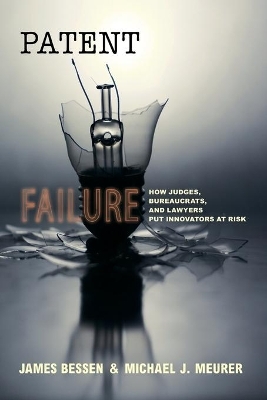
Patent Failure
Princeton University Press (Verlag)
978-0-691-14321-7 (ISBN)
- Lieferbar (Termin unbekannt)
- Versandkostenfrei
- Auch auf Rechnung
- Artikel merken
In recent years, business leaders, policymakers, and inventors have complained to the media and to Congress that today's patent system stifles innovation instead of fostering it. But like the infamous patent on the peanut butter and jelly sandwich, much of the cited evidence about the patent system is pure anecdote--making realistic policy formation difficult. Is the patent system fundamentally broken, or can it be fixed with a few modest reforms? Moving beyond rhetoric, Patent Failure provides the first authoritative and comprehensive look at the economic performance of patents in forty years. James Bessen and Michael Meurer ask whether patents work well as property rights, and, if not, what institutional and legal reforms are necessary to make the patent system more effective. Patent Failure presents a wide range of empirical evidence from history, law, and economics. The book's findings are stark and conclusive. While patents do provide incentives to invest in research, development, and commercialization, for most businesses today, patents fail to provide predictable property rights.
Instead, they produce costly disputes and excessive litigation that outweigh positive incentives. Only in some sectors, such as the pharmaceutical industry, do patents act as advertised, with their benefits outweighing the related costs. By showing how the patent system has fallen short in providing predictable legal boundaries, Patent Failure serves as a call for change in institutions and laws. There are no simple solutions, but Bessen and Meurer's reform proposals need to be heard. The health and competitiveness of the nation's economy depend on it.
James Bessen, a former software developer and CEO, is lecturer at Boston University School of Law. Michael J. Meurer is the Michaels Faculty Research Scholar and professor of law at Boston University.
Preface ix Chapter 1: The Argument in Brief 1 Chapter 2: Why Property Rights Work, How Property Rights Fail 29 Chapter 3: If You Can't Tell the Boundaries, Then It Ain't Property 46 Chapter 4: Survey of Empirical Research: Do Patents Perform Like Property? 73 Chapter 5: What Are U.S. Patents Worth to Their Owners? 95 Chapter 6: The Cost of Disputes 120 Chapter 7: How Important Is the Failure of Patent Notice? 147 Chapter 8: Small Inventors 165 Chapter 9: Abstract Patents and Software 187 Chapter 10: Making Patents Work as Property 215 Chapter 11: Reforms to Improve Notice 235 Chapter 12: A Glance Forward 254 Notes 261 References 295 Index 315
| Zusatzinfo | 21 line illus. 17 tables. |
|---|---|
| Verlagsort | New Jersey |
| Sprache | englisch |
| Maße | 152 x 235 mm |
| Gewicht | 482 g |
| Themenwelt | Recht / Steuern ► EU / Internationales Recht |
| Recht / Steuern ► Wirtschaftsrecht ► Urheberrecht | |
| Wirtschaft ► Betriebswirtschaft / Management ► Finanzierung | |
| Wirtschaft ► Betriebswirtschaft / Management ► Unternehmensführung / Management | |
| ISBN-10 | 0-691-14321-8 / 0691143218 |
| ISBN-13 | 978-0-691-14321-7 / 9780691143217 |
| Zustand | Neuware |
| Haben Sie eine Frage zum Produkt? |
aus dem Bereich


